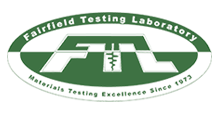
Fairfield Testing Laboratory
Construction Materials Testing & Inspections.
Fairfield Testing has been in the construction business for more than three decades.
Wise, savvy builders throughout history even predating King Solomon have tested and inspected construction material to guarantee a solid foundation and structure. Fairfield Testing Lab's mission is to ensure that the materials you are working with meet your design specifications and are installed accordingly.
Fairfield Testing works strictly with all standards and testing as directed by ACI, AISC and ASTM. We also perform all testing and inspections as set forth by the Statements of Special Inspections, which is addressed in Section 1705 of the International Building Code. We have been providing Materials Testing excellence since 1973 in Accordance with Provisions of Chapter 391 and 541 Section 29-276e of the General Statutes of the State of Connecticut we are accredited by NVLAP (Lab #200871-0) and participate in conformance testing by AAML, CCRL, AASHTO. FTL is certified by the NYCDOB to conduct Special Inspections (ID #003404) as well as being certified to conduct all aspects of Concrete Testing. Our concrete testing laboratory is also certified by NYCDOB (ID# 076).
American Institute of Steel Construction
American Society for Testing and Materials
National Voluntary Laboratory Accreditation (#200871-0)
New York City Dept of Buildings Concrete Laboratory (#003404)
New York City Dept of Buildings Special Inspection Agency (#076)
Services
Soil Testing
Soil, the basic structural building material, is the foundation for about 98% of all buildings. Conducting subsurface investigations prior to building or even purchasing properties saves time and money as well as contributing to budgeting. Our soil services include:
- Atterberg Limits
- Bearing Capacity, Penetrometer
- Bearing Capacity, Plate Load Test
- Casisson Field Inspection
- CBR Plate load testing (Recompacted, on-site, in-place)
- Hydrometer Analysis
- In-place Density, Nuclear Densitometer, Sand Cone
- Mechanical Analysis/Sieve Analysis
- Modified Proctor Testing
- Organic Content
- Permeability
- Septic Requirements
- Soil Classification
- Subsurface Investigation, Borings/Test Pits
Concrete Testing
Concrete, one of the four basic building materials, is composed of hydraulic portland cement, sand, gravel or crushed stone, water and in some cases a chemical admixture. Concrete mixtures typically used for building construction possess compressive strengths between 3,000 psi and 4,000 psi. However, concrete mixtures can be designed to produce strengths anywhere between 1,000 psi and 15,000 psi.
- Air Content (Pressure)
- Air Content (Volumetric)
- Coarse Aggregate Specific Gravity
- Compressive Strength
- Fine Aggregate Specific Gravity
- Flexural Strength
- Unit Weight
- Core Sampling, Windsor Probes and Swiss Hammer Testing can be accomplished for in-place construction
Asphalt Testing
Our Asphalt Services include, but are not limited to the following:
- Bulk Specific Gravity of Compacted Mixtures (SSD)
- Determining the Asphalt Content of HMA by the Ignition Method
- Maximum Specific Gravity of Paving Mixtures (Gmm)
- Mechanical Analysis of Extracted Aggregate
- Percent Air Voids in Compacted Paving Mixtures
- Preparing and Determining the Density of HMA by Means of the SHRP Gyratory Compactor
- Quantitative Extraction of Bitumen from Paving Mixtures
- Resistance of Compacted Mixtures to Moisture Damage
- Resistance to Plastic Flow of Bituminous Mixtures
Structural Steel & Welding
Structural Steel is strong, relatively light weight and exhibits a greater flexible than concrete or masonry products. Commonly, structural steel is used for industrial and institutional buildings as well as for bridge framing. Our services for Structural Steel include, but are not limited to the following:
- Bolt Tensioning Evaluation using Calibrated Torque
- Decking Weld
- Liquid Penetrant Testing
- Magnetic Particle Testing
- Mechanical Fastener Inspections
- Paint Adhesion/Thickness Testing
- Shear Stud Weld Testing
- Skidmore-Wilhelm Evaluations of Bolt Tensioning
- Ultrasonic Inspection
- Verification of Plumbness
- Visual Weld Inspection
- AWI and CWI Certified Inspectors
- Code Compliance
- Nondestructive and Destructive Testing
- Petroleum Plant Surveillance
- Quality Assurance
- Welder Performance and Procedure Development
- Welder Training and Testing
Masonry
Masonry products include bricks, blocks (masonry units) and mortar, which is of a mixture of portland cement, lime and water. Brick are often created from burned clay/shale mixtures. They can also be made using portland cement and fine aggregate. Our Masonry Services include, but are not limited to the following:
- Absorption of Block (Masonry Units)
- Absorption/Saturation Coefficient of Face Brick
- Absorption of Concrete Pavers
- Compressive Strength of Block (Masonry Units)
- Compressive Strength of Face Brick
- Compressive Strength of Masonry Mortar
- Compressive Strength of Concrete Pavers
- Drying Shrinkage of Block (Masonry Units)
- Field Testing of Masonry Mortar
- Fire Rating of Block (Masonry Unit)
Fireproofing
At Fairfield Testing we implement spray-applied fireproofing, classified as a passive fire protection because once installed it remains in place and ready to perform. The necessity of fireproofing is based on the classification of building type and occupancy according to the code authority adopted by the city in which the building is to be constructed. The most common code authorities are the International Building Code (IBC), Building Officials and Code Administrators (BOCA), the Standard Building Code (SBC) and the Uniform Building Code (UBC).
Spray fireproofing materials come in low, medium, and high-density cementitious, low and medium-density mineral fiber, interior or exterior grade and intumescent. FTL specializes in adhesive and cohesion testing to determine bond strength of the fireproofing material to the structural members as well as density testing of the fireproofing material.
You get what you inspect, not what you expect!
Contact Us:
Phone: 203-336-5900


